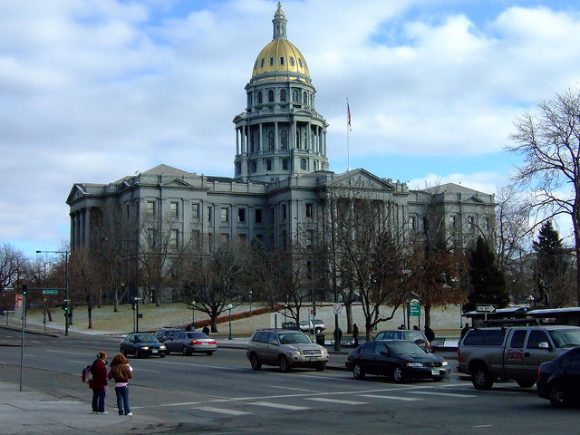
The Colorado State Capitol building in Denver, the home of the Colorado State legislature and governor’s offices. (yosoynuts/Flickr)
Colorado higher education officials, presidents and state actors partnered with University of Colorado Boulder Chancellor Philip DiStefano and members of the University of Colorado Student Government to discuss higher education during the COVID-19 pandemic Monday night.
Dr. Angie Paccione, executive director for the Colorado Department of Education, gave updates on how universities are working during the pandemic.
“We have moved to all remote instruction,” Paccione said. “It is very difficult to participate in online learning without a laptop.”
Colorado has created the No Lapse in Learning initiative for students to receive tech supplies from the state. The program currently has a waitlist that is expected to grow. This is to supplement what many universities such as CU Boulder have already initiated. The state have also created Open Educational Resources, which make textbooks and learning necessities freely available for students.
The Colorado Opportunity Scholarship initiative will apply some of its funding to workers wanting to change careers in the wake of the pandemic. This is because 74% of jobs within the state require some sort of postsecondary accreditation beyond high school diplomas.
Colorado will be dedicating $14.25 billion through the CARES act to higher education. The state will also be allocating $18.7 million to benefit need-based students at CU Boulder.
“Students, don’t fret. Money is coming to you,” Paccione said.
Approximately 250,000 Coloradans applied for unemployment after the state issued a stay at home order in late March.
According to DiStefano, 92% of students who live on campus have returned to their permanent homes. Students who have moved out of campus housing will be given back a portion of their rental fees along with their security deposit if there are no damages.
DiStefano said that due to spring commencement being canceled, the school will hold a live streamed graduation on May 16. Spring 2020 graduates are allowed to return to campus for the May 2021 graduation for special recognition events in wake of the cancelation. Commencement speaker Dan Carlin will speak at the livestream.
“Students have worked extremely hard and we will never be able to adequately replace the loss of the spring commencement ceremony,” DiStefano said. “Were all a part of what’s happening globally.”
CU Boulder has adjusted graduation requirements for graduate students who are planning on graduating in the spring or summer of 2020. It has also asked professors to allow students to submit assignments that were due the week before spring break at a later deadline to help with moving out of Boulder to permanent housing.
DiStefano also mentioned that labs have been allowed to reopen to use 3D printers to make masks for local hospitals. University faculty have already been using labs to create face shields for the Make4Covid initiative, the largest organization in the United States that is set up to create and distribute protective equipment in response to COVID-19
CU Regent John “Jack” Kroll said that the state needs flexibility when colleges look at ACT/SAT scores while evaluating potential students. Because of widespread cancellations of the two college entry exams, many students will be missing out on taking the tests. The College Board has already announced that it will allow at-home testing for Advanced Placement exams in May, which allows students to receive college credit for high school classes.
Kroll noted that CU President Mark Kennedy has been in a coalition with Colorado higher education presidents and chancellors. Kennedy along with 19 other Colorado higher education leaders sent a letter to the Colorado congressional delegation on March 20 advocating for emergency financial aid for students, research and online learning as well as zero-interest refinancing and zero-interest loans.
President Janine Davidson of the Metropolitan State University of Denver has also begun a similar effort to help DACA students. The effort calls for extending work authorization for those with DACA status for another two years, permanently extended protection for Dreamers and a stop to the Trump administration detaining or deporting individuals during the pandemic.
Front Range Community College President Andy Dorsey spoke at the end of the town hall to explain how the college will be handling the pandemic. The college currently has 18,000 students enrolled with over 50 hands-on programs, all of which had to be moved online.
Dorsey said that moving the hands-on programs has “really been a challenge” for Front Range. He explained that most of their students have been working jobs while attending the college which created challenges when moving classes online.
CUSG Legislative Council President Sarah Altshuler and Tri-Executive Ryan Passas explained how CUSG will be working during the pandemic. CUSG affairs have continued as normal but have moved all meetings online. Meetings can be accessed by the public through the Zoom link found on the CUSG website.
Passas explained that CU Boulder’s Volunteer Resource Center has been working to create “food bags” that can be bought using a student meal swipe. Students who use the Swipe it Forward program also have access to these meals. The center is also connecting students to opportunities for volunteering within the Boulder community.
“(The Volunteer Resource Center has) been working very hard to make sure students can stay healthy,” Altshuler said.
The Off-Campus Housing and Neighborhood Relations board is working with the Boulder Rental Housing Association to help students advocate for themselves. The legal advice resource for students has been moved online to assist with renting off-campus. They can also access housing advice from attorney Bruce Sarbaugh.
“We want to acknowledge to all the students watching that this affects each one of us differently,” Passas said. “We are students at a university that prioritizes our health and safety … we ask you all to please, please, please stay home.”
Contact CU Independent Senior News Editor Tory Lysik at tory.lysik@colorado.edu.
